|
Welcome to The Book Corner. In each March and October issue, we will feature books that have recently been published by Oxford University Press in the various AAR/OUP book series. The books featured in this issue were published between July and December 2012. For more books published in the various series, visit www.aarweb.org/Publications/Books.
Hudson, Emily. Disorienting Dharma: Ethics and the Aesthetics of Suffering in the Mahābhārata. Oxford University Press, 2012.
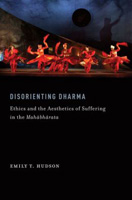 Disorienting Dharma explores the relationship between ethics, aesthetics, and religion in classical Indian literature and literary theory by focusing on one of the most celebrated and enigmatic texts to emerge from the Sanskrit epic tradition: the Mahabharata. This text — one of the principal sources for the study of South Asian religious, social, and political thought — is considered a major transmitter of dharma, or moral, social, and religious duty. But basic questions such as precisely how the epic is communicating its ideas about dharma and precisely what it is saying about it are still being explored. Disorienting Dharma explores the relationship between ethics, aesthetics, and religion in classical Indian literature and literary theory by focusing on one of the most celebrated and enigmatic texts to emerge from the Sanskrit epic tradition: the Mahabharata. This text — one of the principal sources for the study of South Asian religious, social, and political thought — is considered a major transmitter of dharma, or moral, social, and religious duty. But basic questions such as precisely how the epic is communicating its ideas about dharma and precisely what it is saying about it are still being explored.
 In the book, Hudson examines these issues through a variety of interpretive lenses including Sanskrit literary theory, reader-response theory, and narrative ethics. One of the first book-length studies to view the subject through the lens of Indian aesthetics, Hudson’s work brings to light one of the primary narrative tenses of the epic: the vexed relationship between dharma and suffering. Hudson demonstrates how reading the Mahabharata, perhaps the most harrowing story in world literature, can be a fascinating, disorienting, and ultimately transformative experience. In the book, Hudson examines these issues through a variety of interpretive lenses including Sanskrit literary theory, reader-response theory, and narrative ethics. One of the first book-length studies to view the subject through the lens of Indian aesthetics, Hudson’s work brings to light one of the primary narrative tenses of the epic: the vexed relationship between dharma and suffering. Hudson demonstrates how reading the Mahabharata, perhaps the most harrowing story in world literature, can be a fascinating, disorienting, and ultimately transformative experience.
ISBN: 978-0-19-9860784
Manring, Rebecca J. The Fading Light of Advaita Acarya: Three Hagiographies. Oxford University Press, 2012.
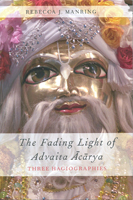 Rebecca J. Manring offers an illuminating study and translation of three hagiographies of Advaita Acarya, a crucial figure in the early years of the devotional Vaisnavism that originated in Bengal in the fifteenth century. Advaita Acarya was about fifty years older than the movement’s putative founder, Caitanya, and is believed to have caused Caitanya’s advent by ceaselessly storming heaven, calling for the divine presence to come to earth. Advaita was a scholar and highly respected pillar of society, whose status lent respectability and credibility to the new movement. A significant body of hagiography and related literature about Advaita Acarya has developed since his death, some as late as the early twentieth century. Rebecca J. Manring offers an illuminating study and translation of three hagiographies of Advaita Acarya, a crucial figure in the early years of the devotional Vaisnavism that originated in Bengal in the fifteenth century. Advaita Acarya was about fifty years older than the movement’s putative founder, Caitanya, and is believed to have caused Caitanya’s advent by ceaselessly storming heaven, calling for the divine presence to come to earth. Advaita was a scholar and highly respected pillar of society, whose status lent respectability and credibility to the new movement. A significant body of hagiography and related literature about Advaita Acarya has developed since his death, some as late as the early twentieth century.
 The three hagiographic texts included in this book examine the years of Advaita’s life that did not overlap with Caitanya’s lifetime, and each paints a different picture of its protagonist. Each composition clearly advocates his view that Advaita was himself divine in some way, and a few go so far as to suggest that Advaita reflected even greater divinity that Caitanya, through miraculous stories that can be found nowhere else in Bengali Vaisnavi literature. Manring provides a detailed introduction to these texts, as well as remarkably faithful translations of Haricarana Dasa’s Advaita Mangala, Laudiya Krsnadasa’s Balya-lila-sutra, and Isana Nagara’s Advaita Prakasa. The three hagiographic texts included in this book examine the years of Advaita’s life that did not overlap with Caitanya’s lifetime, and each paints a different picture of its protagonist. Each composition clearly advocates his view that Advaita was himself divine in some way, and a few go so far as to suggest that Advaita reflected even greater divinity that Caitanya, through miraculous stories that can be found nowhere else in Bengali Vaisnavi literature. Manring provides a detailed introduction to these texts, as well as remarkably faithful translations of Haricarana Dasa’s Advaita Mangala, Laudiya Krsnadasa’s Balya-lila-sutra, and Isana Nagara’s Advaita Prakasa.
ISBN: 978-0-19-9736478
Sasson, Vanessa R., ed. Little Buddhas: Children and Childhoods in Buddhist Texts and Traditions. Oxford University Press, 2012.
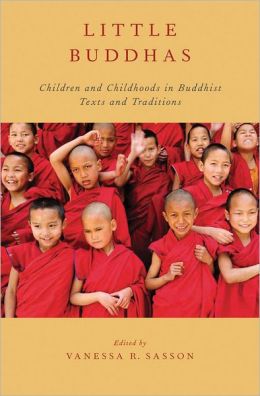 Considerations of children in the academic field of religious studies is taking root, but Buddhist studies has yet to take notice. Little Buddhas brings together a wide range of scholarship and expertise to address the question of what role children have played in Buddhist literature, in particular historical contexts, and what role they continue to play in specific Buddhist contexts today. Considerations of children in the academic field of religious studies is taking root, but Buddhist studies has yet to take notice. Little Buddhas brings together a wide range of scholarship and expertise to address the question of what role children have played in Buddhist literature, in particular historical contexts, and what role they continue to play in specific Buddhist contexts today.
The volume is divided into two parts, one addressing the representation of children in Buddhist texts, the other children and childhoods in Buddhist cultures around the world. The groundbreaking contributions in this volume challenge the perception of irreconcilable differences between Buddhist idealism and family ties.
ISBN: 978-0-19-9945610
Yelle, Robert. The Language of Disenchantment: Protestant Literalism and Colonial Discourse in British India. Oxford University Press, 2012.
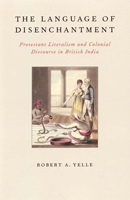 The Language of Disenchantment explores the ways in which Protestant ideas concerning language influenced British colonial attitudes toward and proposals to reform Hinduism. Protestant literalism, mediated by the textual economy of the printed book, inspired colonial critiques of Indian mythological, ritual, linguistic, and legal traditions. Central to these developments was the transportation of the Christian opposition to monotheism and polytheism or idolatry into the domain of language. Polemics against verbal idolatry that had been applied previously to Catholic and sectarian practices in Britain — including the elevation of a scriptural canon over heathenish custom, the attack of the personifications of mythological language, and the critique of "vain repetitions" in prayers and magic spells — were applied by colonialists to Indian linguistic practices. In order to remedy these diseases of language, the British attempted to standardize and codify Indian traditio The Language of Disenchantment explores the ways in which Protestant ideas concerning language influenced British colonial attitudes toward and proposals to reform Hinduism. Protestant literalism, mediated by the textual economy of the printed book, inspired colonial critiques of Indian mythological, ritual, linguistic, and legal traditions. Central to these developments was the transportation of the Christian opposition to monotheism and polytheism or idolatry into the domain of language. Polemics against verbal idolatry that had been applied previously to Catholic and sectarian practices in Britain — including the elevation of a scriptural canon over heathenish custom, the attack of the personifications of mythological language, and the critique of "vain repetitions" in prayers and magic spells — were applied by colonialists to Indian linguistic practices. In order to remedy these diseases of language, the British attempted to standardize and codify Indian traditio ns as a step toward both Anglicanization and Christianization. The colonial understanding of a perfect language as the fulfillment of the monotheistic ideal echoed earlier Christian myths according to which the Gospel had replaced the obscure discourses of pagan oracles and Jewish ritual. ns as a step toward both Anglicanization and Christianization. The colonial understanding of a perfect language as the fulfillment of the monotheistic ideal echoed earlier Christian myths according to which the Gospel had replaced the obscure discourses of pagan oracles and Jewish ritual.
By uncovering the historical roots of the British reordering of South Asian discourses, Yelle's work challenges representations of colonialism, and the modernity that it ushered in, as simply rational or secular.
ISBN: 978-0-19-9925018
Zimmerman, Yvonne. Other Dreams of Freedom: Religion, Sex, and Human Trafficking. Oxford University Press, 2012.
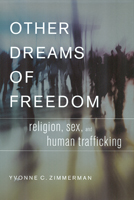 Human trafficking has captured worldwide attention as a crucial moral and political issue, but perhaps nowhere more than in the United States. Since they were signed into law in 2000, U.S. federal laws and policies on human trafficking have been understood as concrete expressions of the civic values of personal and political freedom. Yet these policies have also been characterized by a marked preoccupation with regulation, especially sexual regulation. Human trafficking has captured worldwide attention as a crucial moral and political issue, but perhaps nowhere more than in the United States. Since they were signed into law in 2000, U.S. federal laws and policies on human trafficking have been understood as concrete expressions of the civic values of personal and political freedom. Yet these policies have also been characterized by a marked preoccupation with regulation, especially sexual regulation.
Zimmerman offers a groundbreaking exploration of the relationship between freedom and sexual regulation in American antihuman trafficking law and policies. She argues that the religious values of American Protestantism have indelibly shaped the federal  government’s approach to engaging human trafficking, and that the trajectory of the U.S.’s antitrafficking efforts cannot be fully grasped without understanding the unique ways in which sex, morality, and freedom are connected in Protestant Christian configurations of morality. Zimmerman demonstrates that if opposition to human trafficking takes the promotion of freedom as the point of departure, then freedom must not be identified as strictly with religiously and culturally Protestant understandings of how freedom is constituted, practiced, and maintained. government’s approach to engaging human trafficking, and that the trajectory of the U.S.’s antitrafficking efforts cannot be fully grasped without understanding the unique ways in which sex, morality, and freedom are connected in Protestant Christian configurations of morality. Zimmerman demonstrates that if opposition to human trafficking takes the promotion of freedom as the point of departure, then freedom must not be identified as strictly with religiously and culturally Protestant understandings of how freedom is constituted, practiced, and maintained.
ISBN: 978-0-19-9942190
|
![PDF-NOTE: Internet Explorer Users, right click the PDF Icon and choose [save target as] if you are experiencing problems with clicking.](http://rsnonline.org/templates/rsntemplate-smallmasthead/images/pdf_button.png)



 Disorienting Dharma explores the relationship between ethics, aesthetics, and religion in classical Indian literature and literary theory by focusing on one of the most celebrated and enigmatic texts to emerge from the Sanskrit epic tradition: the Mahabharata. This text — one of the principal sources for the study of South Asian religious, social, and political thought — is considered a major transmitter of dharma, or moral, social, and religious duty. But basic questions such as precisely how the epic is communicating its ideas about dharma and precisely what it is saying about it are still being explored.
Disorienting Dharma explores the relationship between ethics, aesthetics, and religion in classical Indian literature and literary theory by focusing on one of the most celebrated and enigmatic texts to emerge from the Sanskrit epic tradition: the Mahabharata. This text — one of the principal sources for the study of South Asian religious, social, and political thought — is considered a major transmitter of dharma, or moral, social, and religious duty. But basic questions such as precisely how the epic is communicating its ideas about dharma and precisely what it is saying about it are still being explored. In the book, Hudson examines these issues through a variety of interpretive lenses including Sanskrit literary theory, reader-response theory, and narrative ethics. One of the first book-length studies to view the subject through the lens of Indian aesthetics, Hudson’s work brings to light one of the primary narrative tenses of the epic: the vexed relationship between dharma and suffering. Hudson demonstrates how reading the Mahabharata, perhaps the most harrowing story in world literature, can be a fascinating, disorienting, and ultimately transformative experience.
In the book, Hudson examines these issues through a variety of interpretive lenses including Sanskrit literary theory, reader-response theory, and narrative ethics. One of the first book-length studies to view the subject through the lens of Indian aesthetics, Hudson’s work brings to light one of the primary narrative tenses of the epic: the vexed relationship between dharma and suffering. Hudson demonstrates how reading the Mahabharata, perhaps the most harrowing story in world literature, can be a fascinating, disorienting, and ultimately transformative experience. Rebecca J. Manring offers an illuminating study and translation of three hagiographies of Advaita Acarya, a crucial figure in the early years of the devotional Vaisnavism that originated in Bengal in the fifteenth century. Advaita Acarya was about fifty years older than the movement’s putative founder, Caitanya, and is believed to have caused Caitanya’s advent by ceaselessly storming heaven, calling for the divine presence to come to earth. Advaita was a scholar and highly respected pillar of society, whose status lent respectability and credibility to the new movement. A significant body of hagiography and related literature about Advaita Acarya has developed since his death, some as late as the early twentieth century.
Rebecca J. Manring offers an illuminating study and translation of three hagiographies of Advaita Acarya, a crucial figure in the early years of the devotional Vaisnavism that originated in Bengal in the fifteenth century. Advaita Acarya was about fifty years older than the movement’s putative founder, Caitanya, and is believed to have caused Caitanya’s advent by ceaselessly storming heaven, calling for the divine presence to come to earth. Advaita was a scholar and highly respected pillar of society, whose status lent respectability and credibility to the new movement. A significant body of hagiography and related literature about Advaita Acarya has developed since his death, some as late as the early twentieth century. The three hagiographic texts included in this book examine the years of Advaita’s life that did not overlap with Caitanya’s lifetime, and each paints a different picture of its protagonist. Each composition clearly advocates his view that Advaita was himself divine in some way, and a few go so far as to suggest that Advaita reflected even greater divinity that Caitanya, through miraculous stories that can be found nowhere else in Bengali Vaisnavi literature. Manring provides a detailed introduction to these texts, as well as remarkably faithful translations of Haricarana Dasa’s Advaita Mangala, Laudiya Krsnadasa’s Balya-lila-sutra, and Isana Nagara’s Advaita Prakasa.
The three hagiographic texts included in this book examine the years of Advaita’s life that did not overlap with Caitanya’s lifetime, and each paints a different picture of its protagonist. Each composition clearly advocates his view that Advaita was himself divine in some way, and a few go so far as to suggest that Advaita reflected even greater divinity that Caitanya, through miraculous stories that can be found nowhere else in Bengali Vaisnavi literature. Manring provides a detailed introduction to these texts, as well as remarkably faithful translations of Haricarana Dasa’s Advaita Mangala, Laudiya Krsnadasa’s Balya-lila-sutra, and Isana Nagara’s Advaita Prakasa. Considerations of children in the academic field of religious studies is taking root, but Buddhist studies has yet to take notice. Little Buddhas brings together a wide range of scholarship and expertise to address the question of what role children have played in Buddhist literature, in particular historical contexts, and what role they continue to play in specific Buddhist contexts today.
Considerations of children in the academic field of religious studies is taking root, but Buddhist studies has yet to take notice. Little Buddhas brings together a wide range of scholarship and expertise to address the question of what role children have played in Buddhist literature, in particular historical contexts, and what role they continue to play in specific Buddhist contexts today.
 The Language of Disenchantment explores the ways in which Protestant ideas concerning language influenced British colonial attitudes toward and proposals to reform Hinduism. Protestant literalism, mediated by the textual economy of the printed book, inspired colonial critiques of Indian mythological, ritual, linguistic, and legal traditions. Central to these developments was the transportation of the Christian opposition to monotheism and polytheism or idolatry into the domain of language. Polemics against verbal idolatry that had been applied previously to Catholic and sectarian practices in Britain — including the elevation of a scriptural canon over heathenish custom, the attack of the personifications of mythological language, and the critique of "vain repetitions" in prayers and magic spells — were applied by colonialists to Indian linguistic practices. In order to remedy these diseases of language, the British attempted to standardize and codify Indian traditio
The Language of Disenchantment explores the ways in which Protestant ideas concerning language influenced British colonial attitudes toward and proposals to reform Hinduism. Protestant literalism, mediated by the textual economy of the printed book, inspired colonial critiques of Indian mythological, ritual, linguistic, and legal traditions. Central to these developments was the transportation of the Christian opposition to monotheism and polytheism or idolatry into the domain of language. Polemics against verbal idolatry that had been applied previously to Catholic and sectarian practices in Britain — including the elevation of a scriptural canon over heathenish custom, the attack of the personifications of mythological language, and the critique of "vain repetitions" in prayers and magic spells — were applied by colonialists to Indian linguistic practices. In order to remedy these diseases of language, the British attempted to standardize and codify Indian traditio ns as a step toward both Anglicanization and Christianization. The colonial understanding of a perfect language as the fulfillment of the monotheistic ideal echoed earlier Christian myths according to which the Gospel had replaced the obscure discourses of pagan oracles and Jewish ritual.
ns as a step toward both Anglicanization and Christianization. The colonial understanding of a perfect language as the fulfillment of the monotheistic ideal echoed earlier Christian myths according to which the Gospel had replaced the obscure discourses of pagan oracles and Jewish ritual. Human trafficking has captured worldwide attention as a crucial moral and political issue, but perhaps nowhere more than in the United States. Since they were signed into law in 2000, U.S. federal laws and policies on human trafficking have been understood as concrete expressions of the civic values of personal and political freedom. Yet these policies have also been characterized by a marked preoccupation with regulation, especially sexual regulation.
Human trafficking has captured worldwide attention as a crucial moral and political issue, but perhaps nowhere more than in the United States. Since they were signed into law in 2000, U.S. federal laws and policies on human trafficking have been understood as concrete expressions of the civic values of personal and political freedom. Yet these policies have also been characterized by a marked preoccupation with regulation, especially sexual regulation. government’s approach to engaging human trafficking, and that the trajectory of the U.S.’s antitrafficking efforts cannot be fully grasped without understanding the unique ways in which sex, morality, and freedom are connected in Protestant Christian configurations of morality. Zimmerman demonstrates that if opposition to human trafficking takes the promotion of freedom as the point of departure, then freedom must not be identified as strictly with religiously and culturally Protestant understandings of how freedom is constituted, practiced, and maintained.
government’s approach to engaging human trafficking, and that the trajectory of the U.S.’s antitrafficking efforts cannot be fully grasped without understanding the unique ways in which sex, morality, and freedom are connected in Protestant Christian configurations of morality. Zimmerman demonstrates that if opposition to human trafficking takes the promotion of freedom as the point of departure, then freedom must not be identified as strictly with religiously and culturally Protestant understandings of how freedom is constituted, practiced, and maintained.